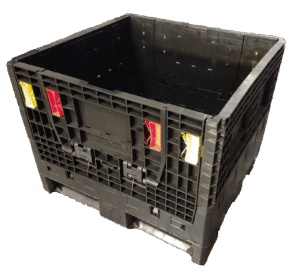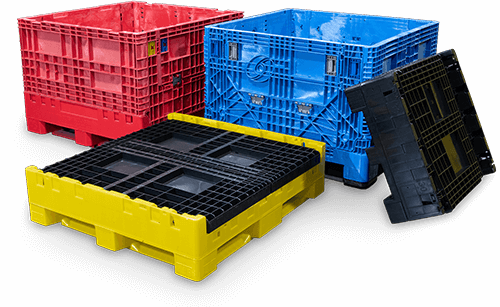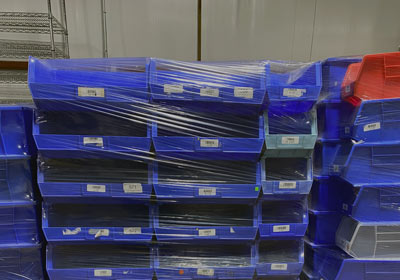Why Mass Containers Are Crucial for Sustainable and Economical Transportation
Mass containers play a crucial function in contemporary logistics. They assist in the reliable motion of big quantities of items, thus optimizing transport procedures. This technique not just lowers expenses but likewise lessens ecological influence with reduced emissions and waste generation. As sectors look for even more sustainable techniques, the adoption of mass containers is coming to be progressively substantial. What implications does this shift hold for future logistics and supply chain management?

The Advantages of Using Bulk Containers in Logistics
Mass containers reinvent logistics by enhancing performance and sustainability. These containers enable the transport of big quantities of products in a single journey, substantially reducing the variety of trips required. This not only simplifies procedures but additionally minimizes labor expenses linked with handling, filling, and dumping. On top of that, mass containers are created to maximize room application within transportation vehicles, ensuring that even more items can be delivered concurrently.
The standardization of mass containers additionally streamlines the logistics process. With uniform dimensions, they can be easily piled and stored, resulting in boosted storage facility management. Mass containers typically include durable materials that protect materials from damage throughout transit, thus reducing product loss and raising total reliability. Consequently, businesses can experience boosted supply chain performance, inevitably bring about boosted success and customer contentment. This mix of elements makes bulk containers a critical possession in modern-day logistics.
Environmental Effect: Lowering Waste and Carbon Impact
As sectors significantly focus on sustainability, the fostering of mass containers has arised as a vital technique for lowering waste and lowering carbon impacts. These containers reduce making use of packaging materials, such as boxes and plastic, thereby notably reducing overall waste generation. By combining shipments, bulk containers boost transportation effectiveness, permitting more products to be moved per trip. This reduction in trips straight correlates with lower greenhouse gas emissions, contributing to a smaller sized carbon impact.
Mass containers can frequently be recycled or reused, further reducing ecological effect. The resilience of these containers assurances they can endure several transportation cycles, reducing the need for single-use choices. used collapsible containers. By streamlining logistics and promoting effective source usage, mass containers not just sustain sustainable methods however additionally motivate industries to align with global environmental goals. Eventually, their application reflects a dedication to eco-friendly stewardship and liable source monitoring
Expense Financial Savings: Just How Mass Containers Lower Transport Costs
While lots of business seek means to improve their lower line, using mass containers offers a significant opportunity for reducing transportation expenses. Mass containers maximize the volume of goods moved, enabling companies to ship bigger amounts at when. This effectiveness lowers the number of journeys called for, straight reducing fuel prices and minimizing labor expenditures connected with loading and discharging.
Additionally, bulk containers often include structured designs that maximize area usage within transport lorries. This means fewer vacant areas, bring about much more reliable usage of offered capacity. Moreover, the sturdiness of bulk containers can reduce the risk of item damage throughout transportation, reducing losses and making certain that more goods show up intact.
Enhancing Supply Chain Efficiency With Mass Storage Space Solutions
Bulk storage space solutions play a vital duty in enhancing supply chain effectiveness by optimizing stock monitoring. By settling goods into less, bigger containers, services can greatly decrease dealing with expenses related to regular transfers and processing. This streamlined method permits much better tracking and administration of inventory, ultimately resulting in enhanced operational performance.
Structured Supply Monitoring
Reliable supply monitoring is essential for maximizing supply chain operations, specifically when organizations take on bulk storage services. These options enable services to preserve greater stock levels while decreasing the frequency of replenishment. By consolidating products right into mass containers, business can improve their supply processes, minimizing the intricacy connected with tracking several smaller packages. This method helps with accurate inventory matters and enhances forecasting precision, enabling more enlightened decision-making. Furthermore, bulk storage space services simplify stockroom company, making it less complicated to situate and gain access to products when required. As an outcome, organizations can achieve an extra effective stock turn over price, eventually improving total supply chain performance and lowering the possibility of stockouts or overstock scenarios.

Decreased Handling Prices
The implementation of bulk storage space services not just enhances supply management yet also significantly lowers managing prices across the supply chain. By settling materials into bulk containers, firms lessen the need for regular handling and transfer in between various storage and transportation units. This method reduces labor expenses connected with loading, dumping, and relocating smaller sized packages. Additionally, bulk storage reduces the regularity of shipments, leading to lower transportation costs and decreased fuel consumption. Consequently, services can maximize their logistics operations, enabling a more effective allowance of sources. Eventually, reduced taking care of costs contribute to enhanced general supply chain performance, cultivating an environment that supports both sustainability and financial practicality.

Convenience of Mass Containers Across Different Industries
Many industries have distinct needs for transport and storage, bulk containers have emerged as a flexible option that fulfills a wide array of needs. These containers, varying from large bins to specialized containers, can suit diverse products, including powders, fluids, and granules. In the farming field, mass containers facilitate the transport of fertilizers and grains, while the food and beverage industry utilizes them for components and completed products. The chemical market counts on mass containers for securely delivering harmful materials, making sure conformity with security guidelines. Furthermore, building firms take advantage of bulk containers for transferring aggregates and other materials. Their flexibility encompasses various modes of transportation, consisting of trains, vehicles, and ships, improving logistical effectiveness. This adaptability not just improves operations throughout various industries but additionally advertises sustainability by decreasing packaging waste and maximizing room in transportation. Mass containers play a necessary role in modern-day supply chain administration.
Future Trends wholesale Container Usage and Sustainability
The future of mass container usage is increasingly formed by innovative products advancement that enhances sustainability. Furthermore, automation in logistics promises to streamline procedures, decreasing waste and boosting performance. Embracing round economy practices will further revolutionize how bulk containers are developed, used, and recycled, cultivating a more lasting transportation landscape.
Ingenious Products Development
As sectors increasingly focus on sustainability, ingenious materials development in bulk containers emerges as a considerable consider enhancing eco-friendly transportation remedies. Researchers and makers are checking out eco-friendly plastics, recycled compounds, and lightweight metals to lower environmental impact. These materials not just decrease waste but likewise boost gas efficiency by reducing the total weight of containers. In addition, innovations in smart materials, which can adapt to varying conditions, improve the toughness and capability of mass containers. The integration of these cutting-edge materials lines up with circular economic situation principles, promoting reuse and recycling. As the demand for sustainable practices grows, the development of such materials will certainly play a vital role fit the future of bulk container usage in logistics and transportation.
Automation in Logistics
Significant developments in automation are poised to transform logistics and the usage of bulk containers, improving sustainability in transportation. Automated systems, helpful site including drones and self-governing cars, are improving the motion of bulk containers, decreasing the reliance on conventional fuel-powered transport. These technologies optimize transmitting and filling procedures, boosting and decreasing empty miles fuel efficiency. Additionally, automated inventory monitoring systems boost tracking and tracking of bulk containers, guaranteeing much better resource allocation and reduced waste. The assimilation of the Net of Points (IoT) allows real-time data evaluation, allowing proactive decision-making that straightens with sustainability goals. As automation remains to advance, it is expected to drive further technologies in bulk container use, eventually sustaining more lasting logistics practices and lowering the environmental influence of transportation.
Round Economic Climate Practices
Innovations in automation are establishing the phase for an extra integrated technique to circular economy methods in the domain of mass container usage. As sectors progressively welcome sustainability, mass containers are being made for durability and reusability. This change not only lessens waste but likewise improves source efficiency. Companies are adopting strategies such as closed-loop systems, where made use of containers are accumulated, refurbished, and reintroduced into the supply chain. Additionally, wise technologies track container life process, promoting better administration and reducing environmental effect. The cooperation between producers, logistics service providers, and end-users is crucial in establishing standards for sustainable container use. used plastic containers. Future trends suggest an expanding focus on products that are naturally degradable and recyclable, further strengthening the circular economy's concepts wholesale transportation

Regularly Asked Concerns
What Materials Are Mass Containers Typically Made From?
Mass containers are commonly created from sturdy materials such as high-density polyethylene, cardboard, steel, and aluminum. These products offer stamina, adaptability, and protection, making them suitable for his comment is here carrying numerous products in various sectors efficiently.
How Do I Pick the Right Size Mass Container?
Selecting the ideal dimension bulk container includes assessing the volume of materials to be moved, considering managing devices compatibility, and assessing storage space needs. Proper size guarantees performance in transport and lessens waste during delivery.
Are Mass Containers Reusable or Recyclable?
Mass containers are typically reusable, created for multiple trips, improving sustainability. link Lots of can additionally be recycled, depending upon the products utilized. Selecting recyclable alternatives additionally reduces and supports ecological goals waste in transport techniques.
What Safety And Security Rules Apply to Bulk Container Transportation?
Safety and security guidelines for mass container transportation include conformity with the Department of Transport guidelines, appropriate labeling of harmful materials, architectural honesty evaluations, and adherence to weight restrictions to assure risk-free handling and stop mishaps during transit.
Just How Can Services Shift to Utilizing Mass Containers Effectively?
Organizations can change to bulk containers by examining present logistics, training team on handling, purchasing ideal tools, maximizing supply administration, and working together with providers to assure compatibility and effectiveness throughout the supply chain.
As markets increasingly prioritize sustainability, the fostering of mass containers has actually emerged as a key approach for reducing waste and lowering carbon impacts. By combining products into bulk containers, companies can enhance their supply procedures, decreasing the intricacy connected with tracking several smaller packages. As industries increasingly prioritize sustainability, cutting-edge materials growth in bulk containers arises as a substantial aspect in boosting green transportation services. Automated systems, including drones and self-governing cars, are simplifying the motion of bulk containers, decreasing the reliance on conventional fuel-powered transport. Furthermore, automated inventory administration systems enhance monitoring and surveillance of bulk containers, making certain much better source allotment and decreased waste.